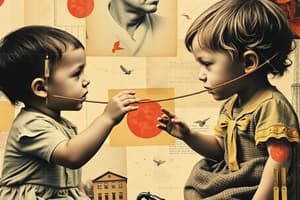Podcast
Questions and Answers
Which of the following best describes the nature of developmental changes?
Which of the following best describes the nature of developmental changes?
- Irregular and unpredictable
- Random and sporadic
- Reversible and chaotic
- Progressive, Orderly, Sequential (correct)
Which of the following is NOT considered a broad domain of development?
Which of the following is NOT considered a broad domain of development?
- Financial Development (correct)
- Physical Development
- Cognitive Development
- Emotional Development
What is a characteristic of gross motor skills?
What is a characteristic of gross motor skills?
- Focusing on small, precise tasks
- Develops balance and coordination
- Involves large muscle movements (correct)
- Requires fine hand movements
How do gross motor skills relate to fine motor skills as development progresses?
How do gross motor skills relate to fine motor skills as development progresses?
Which of the following statements reflects a common misconception about developmental changes?
Which of the following statements reflects a common misconception about developmental changes?
Which concept addresses the hierarchical structure of human needs?
Which concept addresses the hierarchical structure of human needs?
Which principle of development suggests that growth occurs from the head downwards?
Which principle of development suggests that growth occurs from the head downwards?
What is primarily measured by IQ tests?
What is primarily measured by IQ tests?
Which of the following best describes Emotional Intelligence?
Which of the following best describes Emotional Intelligence?
Which theory emphasizes the role of practical, creative, and analytical abilities in intelligence?
Which theory emphasizes the role of practical, creative, and analytical abilities in intelligence?
What is a key characteristic of gifted children?
What is a key characteristic of gifted children?
Which of the following best describes individual differences in development?
Which of the following best describes individual differences in development?
Which term refers to the blend of cognition and emotion in psychological processes?
Which term refers to the blend of cognition and emotion in psychological processes?
Which element is NOT part of Piaget’s Cognitive Theory?
Which element is NOT part of Piaget’s Cognitive Theory?
What does the Theory of Kohlberg’s Moral Development primarily focus on?
What does the Theory of Kohlberg’s Moral Development primarily focus on?
Which aspect is emphasized in inclusive education?
Which aspect is emphasized in inclusive education?
Which term describes a qualitative change in growth and development?
Which term describes a qualitative change in growth and development?
What significant legislation was enacted in 2009 regarding education?
What significant legislation was enacted in 2009 regarding education?
What is one of the focuses of 21st Century Skills?
What is one of the focuses of 21st Century Skills?
Which of the following is NOT a common type of learning disability?
Which of the following is NOT a common type of learning disability?
What is the primary focus of Metacognition?
What is the primary focus of Metacognition?
Which of the following does NOT fall under Thorndike's Trial and Error Theory?
Which of the following does NOT fall under Thorndike's Trial and Error Theory?
In growth and development, a 'qualitative change' refers to which of the following?
In growth and development, a 'qualitative change' refers to which of the following?
Which activities are considered fine motor skills?
Which activities are considered fine motor skills?
What is the primary focus of cognitive development?
What is the primary focus of cognitive development?
What aspect does socialisation contribute to throughout life?
What aspect does socialisation contribute to throughout life?
Emotional development involves which of the following skills?
Emotional development involves which of the following skills?
Which of the following brain functions is associated with the left brain?
Which of the following brain functions is associated with the left brain?
What does maturity in emotional development closely relate to?
What does maturity in emotional development closely relate to?
Which statement best describes the process of socialisation?
Which statement best describes the process of socialisation?
What emotional aspect is emphasized as a key part of emotional development?
What emotional aspect is emphasized as a key part of emotional development?
What is the primary focus of growth as defined in the context?
What is the primary focus of growth as defined in the context?
Which of the following is NOT a characteristic of the Pre-Operational stage?
Which of the following is NOT a characteristic of the Pre-Operational stage?
What does the term 'reversibility' refer to in cognitive development?
What does the term 'reversibility' refer to in cognitive development?
During which stage do children typically start to classify objects based on attributes like color and size?
During which stage do children typically start to classify objects based on attributes like color and size?
What common misconception is reflected in the understanding of animism at the Pre-Operational stage?
What common misconception is reflected in the understanding of animism at the Pre-Operational stage?
Which cognitive characteristic is displayed by children in the Concrete Operational stage?
Which cognitive characteristic is displayed by children in the Concrete Operational stage?
What does centration in cognitive development refer to?
What does centration in cognitive development refer to?
What aspect of cognitive development is commonly lacking in children during the Pre-Operational stage?
What aspect of cognitive development is commonly lacking in children during the Pre-Operational stage?
Flashcards are hidden until you start studying
Study Notes
Growth and Development
- Growth and Development are intertwined processes involving qualitative and quantitative changes.
- Qualitative changes are non-measurable alterations in how someone performs or understands a task.
- Quantitative changes refer to measurable changes in size, weight, or shape.
- Development is progressive, orderly, and sequential, meaning it unfolds in a predictable pattern.
- Developmental changes are not reversible (you cannot undo prior development) but can be modified through experiences and interventions.
Domains of Development
- Development occurs across multiple domains: physical, cognitive, social, and emotional.
- Physical Development: Involves changes in height, weight, size, shape, and motor skills like gross (large muscle) and fine (small muscle) movements.
- Cognitive Development: Focuses on changes in mental capabilities, including thinking, reasoning, problem-solving, and language.
- Social Development: Deals with changes in interactions with others, relationships, and social behaviors.
- Emotional Development: Involves learning to manage and express emotions, understanding different feelings, and building emotional intelligence.
Growth
- Growth is about quantitative changes in size and structure - it is measurable.
- Maturity is a critical aspect of growth, representing the full potential development of an organism.
- Factors like genes (heredity) greatly influence an individual's maturity.
Development
- Development refers to qualitative changes in abilities, knowledge, understanding, and skills that are not easily measured.
- Development is a lifelong process, starting from conception and continuing throughout life.
Stages of Development
- The text does not explicitly outline specific stages of development but highlights Piaget's Cognitive Theory which breaks down development into four stages:
- Sensorimotor Stage (0-2 years): Infants learn through their senses and motor actions, developing object permanence (knowing objects still exist even if they're hidden).
- Pre-operational Stage (2-7 years): Children develop symbolic thought (using language, drawings, and symbols) but lack logical thinking and have difficulty with concepts like conservation (understanding that the amount of something stays the same even if its appearance changes).
- Concrete Operational Stage (7-11 years): Children gain the ability to think logically about concrete objects and events, developing conservation, classification, and reversibility (understanding that actions can be undone).
- Formal Operational Stage (11+ years): Adolescents develop abstract thinking, hypothetical reasoning, and the ability to solve complex problems involving abstract ideas.
Principles of Development
Principles of Direction
- Cephalocaudal: Development progresses from head to toe, explaining why babies can lift their heads before controlling their legs.
- Proximodistal: Development moves from the center of the body outwards, with trunk control developing before fine motor skills in the hands.
Individual Differences
- People develop at different paces due to individual differences in traits, genetics, environmental factors, and socioeconomic conditions.
Basis of Individual Differences
- Heredity: Inherited traits influence physical and cognitive development, impacting abilities and strengths.
- Environment: A person's surroundings, including family, culture, and access to resources, play a significant role in shaping development pathways.
Motivation
- Motivation is the "moving force" that drives action, influencing learning and developmental progress.
- Intrinsic motivation: Comes from within, stemming from personal interests, enjoyment, or the desire to learn.
- Extrinsic motivation: Comes from external sources, such as rewards, praise, or avoiding punishment.
Abraham Maslow's Need's Hierarchy
- Maslow's Hierarchy outlines a pyramid of human needs, starting with basic physiological needs at the bottom and progressing to higher-order needs like self-actualization at the top.
- The hierarchy suggests that we must fulfill lower-level needs before striving for higher ones.
Concept of IQ
- IQ (Intelligence Quotient) is a measure of cognitive ability, typically assessed through standardized tests.
- IQ scores indicate an individual's relative intellectual strengths and weaknesses.
Creativity and Intelligence
- Creativity and Intelligence are distinct but interconnected cognitive abilities.
- Intelligence involves problem-solving, reasoning, and knowledge acquisition.
- Creativity focuses on generating original ideas, thinking outside the box, and finding innovative solutions.
Gifted Children
- Gifted children demonstrate exceptional abilities in one or more areas, often displaying advanced cognitive skills, creativity, or talent.
- Supporting gifted children requires specialized educational programs that cater to their unique needs and pace of learning.
Emotional Intelligence (EQ)
- Emotional Intelligence (EQ) is the ability to understand, manage, and express emotions effectively.
- Individuals with high EQ are skilled at building relationships, managing stress, resolving conflicts, and understanding others' perspectives.
Cognition and Emotion
- Cognition and Emotion are intertwined and significantly impact each other.
- Emotions can influence how we think, process information, and make decisions.
- Our thoughts and interpretations of situations can also trigger emotional responses.
Theory of Multiple Intelligence
- Howard Gardner's theory proposes that intelligence is multifaceted, consisting of multiple independent abilities, rather than a single, general intelligence.
- Different types of intelligence include:
- Linguistic: Strong verbal skills, good at language and communication.
- Logical-Mathematical: Excellent reasoning, problem-solving, and numerical skills.
- Spatial: Strong visual thinking, good at spatial reasoning and understanding maps.
- Musical: Highly sensitive to rhythm, pitch, and music.
- Bodily-Kinesthetic: Excellent coordination, physical dexterity, and athleticism.
- Interpersonal: Highly skilled at understanding and interacting with others.
- Intrapersonal: Self-aware, good at introspection and understanding their emotions.
- Naturalistic: Keen observation of nature, good at understanding natural systems.
Triarchic Theory of Intelligence
- Robert Sternberg's Triarchic Theory of Intelligence breaks down intelligence into three components:
- Analytical Intelligence: Focuses on critical thinking, reasoning, and problem-solving skills.
- Creative Intelligence: Emphasizes imagination, innovation, and generating unique solutions.
- Practical Intelligence: Highlights the ability to adapt, apply knowledge to real-world situations, and learn from everyday experiences.
Piaget’s Cognitive Theory
- Piaget's theory focuses on cognitive development, outlining how children's thinking evolves through distinct stages.
- Piaget proposed four key elements of cognitive development:
- Schema: Mental structures that organize information and experiences.
- Assimilation: Integrating new information into pre-existing schemas.
- Accommodation: Modifying or creating new schemas to fit new experiences.
- Equilibration: Seeking balance between assimilation and accommodation to achieve cognitive equilibrium.
Process of Equilibration
- The process of equilibration is crucial for intellectual growth, as it drives cognitive development.
- When encountering new information that doesn't fit current schemas, disequilibrium arises, creating a motivation to learn and update thinking to restore balance.
Process of Adaptation
- Adaptation involves assimilation and accommodation, allowing individuals to adjust to new information and maintain cognitive equilibrium.
- Assimilation involves fitting new information into existing mental frameworks (schemas).
- Accommodation involves altering or creating new schemas to accommodate new knowledge or experiences that don't fit existing mental models.
Theory of Kohlberg’s Moral Development
- Kohlberg's theory focuses on how our moral reasoning and understanding of right and wrong evolve over our lifespan.
- He proposed six stages of moral development, grouped into three levels:
Level 1: Pre-conventional Morality
- Stage 1: Obedience and Punishment Orientation: Behavior driven by avoiding punishment and following rules to avoid consequences.
- Stage 2: Individualism and Exchange: Focuses on getting rewards and reciprocating favors – "what's in it for me?"
Level 2: Conventional Morality
- Stage 3: Good Interpersonal Relationships: Actions guided by gaining approval from others and fulfilling social expectations.
- Stage 4: ** Maintaining the Social Order:** Actions driven by upholding laws, rules, and social norms to maintain order.
Level 3: Post-conventional Morality
- Stage 5: Social Contract and Individual Rights: Acceptance of social contracts, while recognizing individual rights and flexible interpretations of laws.
- Stage 6: Universal Principles: Actions guided by universal ethical principles, independent of societal rules.
Inclusive Education
- Inclusive education aims to integrate all students, regardless of abilities or disabilities, into mainstream education.
- Inclusivity ensures access to learning opportunities, appropriate support services, and a welcoming environment for all students.
Types of Disability
- Disability refers to a physical or mental impairment that limits an individual's ability to participate fully in society.
- Physical Disabilities: Include limitations in mobility, strength, or sensory functions.
- Cognitive Disabilities: Impact intellectual functioning, learning, or cognitive abilities.
- Learning Disabilities: Involve specific difficulties in learning, such as dyslexia, dysgraphia, dyscalculia, and attention-deficit/hyperactivity disorder (ADHD).
Gifted Children
- Gifted children demonstrate exceptional abilities in one or more areas compared to their peers.
- Identifying and supporting gifted children requires specialized educational programs that cater to their needs, such as acceleration, enrichment, and individualized instruction.
RTE Act, 2009
- The Right of Children to Free and Compulsory Education Act, 2009 (RTE Act) guarantees free and compulsory education for all children aged 6 to 14 years.
- The RTE Act emphasizes quality education, ensuring that all children, regardless of their background, have access to quality learning experiences.
Socialization
- Socialization is the process of learning and internalizing the values, norms, and behaviors of a society or culture.
- Through interactions with family, peers, schools, and society at large, individuals develop social skills, understanding social expectations, and learning roles and responsibilities.
Child Centered Education
- Child-centered education focuses on meeting the unique needs and interests of each child, promoting active learning, creativity, and exploration.
- Key principles include:
- Individualized instruction: Tailoring learning to individual paces and strengths.
- Active learning experiences: Engaging students through hands-on activities, projects, and exploration.
- Play-based learning: Recognizing the importance of play for cognitive, social, and emotional development.
- Intrinsic motivation: Fostering a love for learning and a desire to learn for its own sake.
Language
- Language is a fundamental tool for communication, learning, and social interaction.
- Language acquisition and development play a crucial role in cognitive development, shaping thought, reasoning, and problem-solving abilities.
Gender
- Gender refers to the socially constructed roles, behaviors, expressions, and identities associated with being male, female, or non-binary.
- Understanding gender differences and promoting gender equality in education is essential for creating a fair and equitable learning environment.
Bloom's Taxonomy
- Bloom's Taxonomy outlines a hierarchy of cognitive skills, from basic to complex, guiding educators in designing meaningful learning activities and assessments.
- The six levels are:(from basic to complex)
- Knowledge: Remembering factual information.
- Comprehension: Understanding and interpreting information.
- Application: Applying knowledge to new situations.
- Analysis: Breaking down information into its components.
- Synthesis: Combining ideas to create something new.
- Evaluation: Making judgments based on criteria and evidence.
Thorndike (Trial and Error Theory)
- Thorndike's Trial and Error Theory suggests that learning occurs through repeated attempts, successes, and failures.
- Through this process, learners gradually eliminate incorrect responses and strengthen connections with actions that lead to desired outcomes.
National Education Policy 2020
- The National Education Policy 2020 aims to transform India's education system, promoting quality, equity, and inclusivity.
- Key objectives include:
- Focus on holistic development: Integrating cognitive, emotional, social, and physical development for well-rounded individuals.
- Emphasis on 21st Century skills: Equip students with critical thinking, creativity, collaboration, and problem-solving skills.
- Flexible pathways and multidisciplinary learning: Promoting diverse learning pathways and incorporating interdisciplinary learning experiences.
- Increased access and equity: Ensuring access to quality education for all, regardless of background.
21st Century Skills
- 21st Century skills are essential for success in today's rapidly changing world.
- These skills include:
- Critical thinking: Analyzing information, evaluating arguments, and forming logical conclusions.
- Creativity: Generating innovative ideas and solutions, thinking outside the box.
- Collaboration: Working effectively in teams, communicating clearly, and sharing ideas.
- Communication: Expressing ideas effectively, both orally and in writing.
- Problem-solving: Identifying and finding solutions to complex problems.
- Digital literacy: Using technology proficiently and understanding its impact.
- Adaptability and resilience: Being flexible, learning quickly, and navigating change.
Metacognition
- Metacognition is the ability to think about one's own thinking, understanding how we learn, monitoring our own progress, and adjusting our strategies as needed.
- Developing metacognition is crucial for effective learning, as it empowers students to take ownership of their learning and become active learners.
Studying That Suits You
Use AI to generate personalized quizzes and flashcards to suit your learning preferences.




